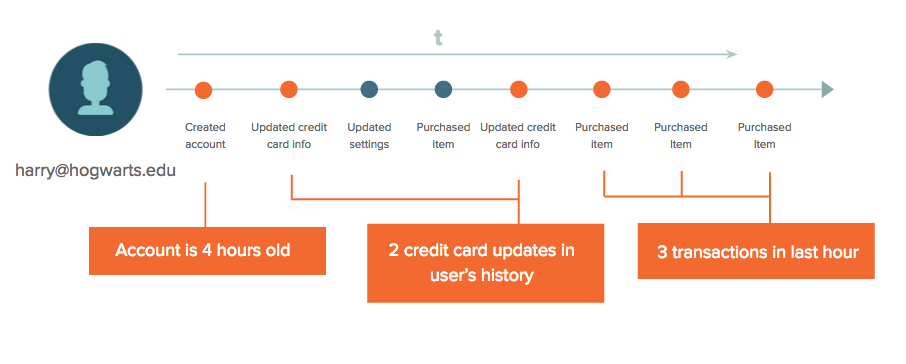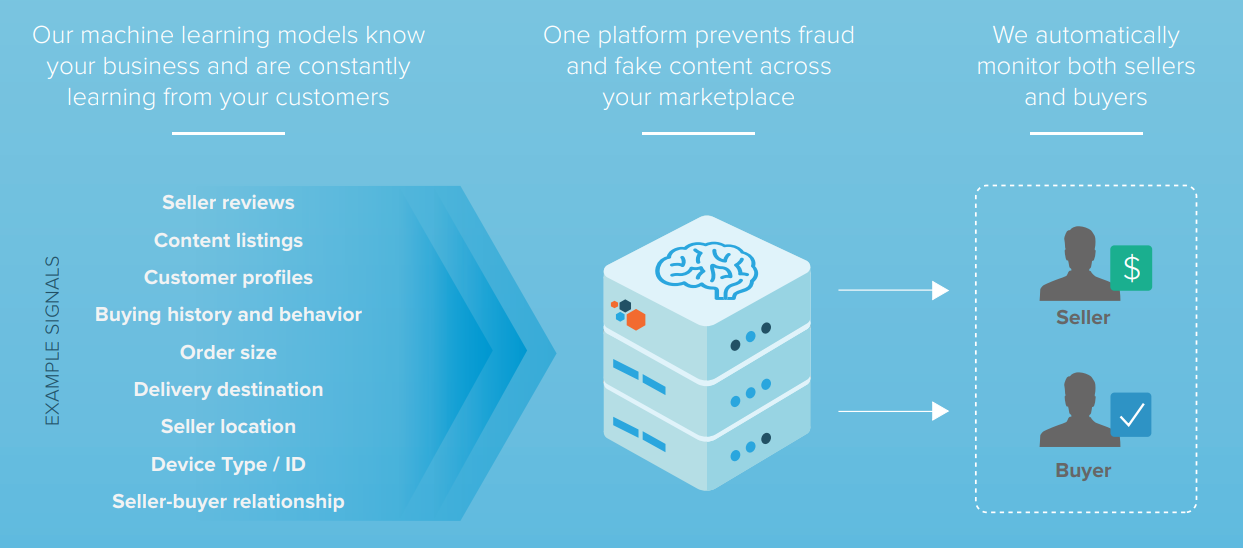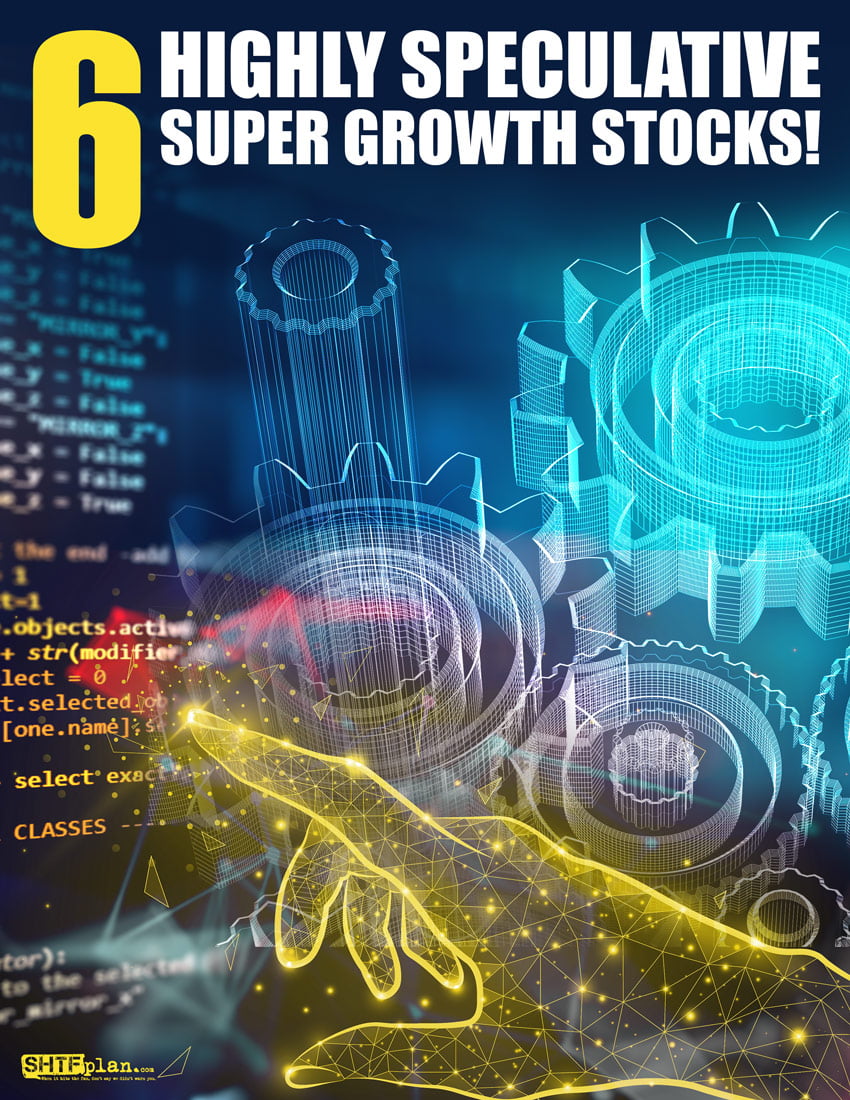
TRUMP SAYS: HUNTER MAKES FORTUNE FROM SHADY DEALS!
BIDEN FAMILY STINKS TO HIGH HEAVENS OF CORRUPTION!
DON'T GET LEFT OUT: HUNTER MUST BE STOPPED!

This article was originally published by Tyler Durden at Zero Hedge

Nearly everything we buy, how we buy, and where we’re buying from is secretly fed into AI-powered verification services that help companies guard against credit-card and other forms of fraud, according to the Wall Street Journal.
More than 16,000 signals are analyzed by a service called Sift, which generates a “Sift score” ranging from 1 – 100. The score is used to flag devices, credit cards and accounts that a vendor may want to block based on a person or entity’s overall “trustworthiness” score, according to a company spokeswoman.
From the Sift website: “Each time we get an event — be it a page view or an API event — we extract features related to those events and compute the Sift Score. These features are then weighed based on fraud we’ve seen both on your site and within our global network, and determine a user’s Score. There are features that can negatively impact a Score as well as ones which have a positive impact.”

The system is similar to a credit score – except there’s no way to find out your own Sift score.
Factors which contribute to one’s Sift score (per the WSJ):
Is the account new?
• Are there are a lot of digits at the end of an email address?
• Is the transaction coming from an IP address that’s unusual for your account?
• Is the transaction coming from a region where there are a lot of hackers, such as China, Russia or Eastern Europe?
• Is the transaction coming from an anonymization network?
• Is the transaction happening at an odd time of day?
• Has the credit card being used had chargebacks associated with it?
• Is the browser different from what you typically use?
• Is the device different from what you typically use?
• Is the cadence of the way you typed out your password typical for you? (tracked by some advanced systems)
Sources: Sift, SecureAuth, Patreon
The system is used by companies such as Airbnb, OpenTable, Instacart and LinkedIn.

Companies that use services like this often mention it in their privacy policies—see Airbnb’s here—but how many of us realize our account behaviors are being shared with companies we’ve never heard of, in the name of security? How much of the information one company shares with these fraud-detection services is used by other clients of that service? And why can’t we access any of this data ourselves, to update, correct or delete it?
According to Sift and competitors such as SecureAuth, which has a similar scoring system, this practice complies with regulations such as the European Union’s General Data Protection Regulation, which mandates that companies don’t store data that can be used to identify real human beings unless they give permission.
Unfortunately GDPR, which went into effect a year ago, has rules that are often vaguely worded, says Lisa Hawke, vice president of security and compliance at the legal tech startup Everlaw. All of this will have to get sorted out in court, she adds. –Wall Street Journal
In order to optimize scoring “Sift regularly evaluates the performance of our models and tries to minimize bias and variance in order to maximize accuracy,” according to a spokeswoman.
“While we don’t perform audits of our customers’ systems for bias, we enable the organizations that use our platform to have as much visibility as possible into the decision trees, models or data that were used to reach a decision,” according to SecureAuth Vice President and chief security architect Stephen Cox. “In some cases, we may not be fully aware of the means by which our services and products are being used within a customer’s environment.”
Not always right
While Sift and SecureAuth strive for accuracy, sometimes it’s difficult to decipher authentic purchasing behavior from fraud.
“Sometimes your best customers and your worst customers look the same,” said Jacqueline Hart, head of trust and safety at Patreon – a site used by artists and creators to allow benefactors to support them. “You can have someone come in and say I want to pledge $10,000 and they’re either a fraudster or an amazing patron of the arts,” Hart added.
If an account is rejected due to its Sift score, Patreon directs the benefactor to the company’s trust and safety team. “It’s an important way for us to find out if there are any false positives from the Sift score and reinstate the account if it shouldn’t have been flagged as high risk,” said Hart.
There are many potential tells that a transaction is fishy. “The amazing thing to me is when someone fails to log in effectively, you know it’s a real person,” says Ms. Hart. The bots log in perfectly every time. Email addresses with a lot of numbers at the end and brand new accounts are also more likely to be fraudulent, as are logins coming from anonymity networks such as Tor.
These services also learn from every transaction across their entire system, and compare data from multiple clients. For instance, if an account or mobile device has been associated with fraud at, say, Instacart, that could mark it as risky for another company, say Wayfair—even if the credit card being used seems legitimate, says a Sift spokeswoman. –Wall Street Journal
A person’s Sift score is constantly changing based on that user’s behavior, and any new information the system gathers about them, according to the spokeswoman. From Sift:
We learn in real-time, which means Scores are constantly being recalculated based on new knowledge of fraudulent users and patterns. For example, when someone logs in, we’ve found out a lot of information in the meantime about suspicious devices, IP addresses, shipping addresses, etc., based on the activity of other users. Add this to the fact that there may have been some new labeled users since their last login, and the scores can sometimes have a significant change. This is also more likely if the user hasn’t had much activity on your site. –Sift.com
While Sift judges whether or not one can be trusted, there’s no file with your name on it that it can produce for review – because it doesn’t need your name to analyze your behavior, according to the report – which seems like total BS.
“Our customers will send us events like ‘account created,’ ‘profile photo uploaded,’ ‘someone sent a message,’ ‘review written,’ ‘an item was added to shopping cart,” says Sift CEO Jason Tan.
It’s technically possible to make user data difficult or impossible to link to a real person. Apple and others say they take steps to prevent such “de-anonymizing.” Sift doesn’t use those techniques. And an individual’s name can be among the characteristics its customers share with it in order to determine the riskiness of a transaction.
In the gap between who is taking responsibility for user data—Sift or its clients—there appears to be ample room for the kind of slip-ups that could run afoul of privacy laws. Without an audit of such a system it’s impossible to know. Companies live under increasing threat of prosecution, but as just-released research on biases in Facebook ’s advertising algorithm suggest, even the most sophisticated operators don’t seem to be fully aware of how their systems are behaving. –Wall Street Journal
“I would argue that in our desire to protect privacy, we have to be careful, because are we going to make it impossible for the good guys to perform the necessary function of security?” asks Anshu Sharma – co-founder of Clearedin, a startup which helps companies avoid falling victim to email phishing attacks.
His solution? Transparency. When a company rejects a potential customer based on their Sift score, for example, it should explain why – even if that exposes how the scoring system works.

It Took 22 Years to Get to This Point
Two domestic cats have died after drinking raw milk recalled for bird flu risk in California. A...
This article was originally published by Rhoda Wilson at The Exposé. We have all become familiar...
Conservative political commentator Tucker Carlson took part in a wide-ranging interview that was...
Commenting Policy:
Some comments on this web site are automatically moderated through our Spam protection systems. Please be patient if your comment isn’t immediately available. We’re not trying to censor you, the system just wants to make sure you’re not a robot posting random spam.
This website thrives because of its community. While we support lively debates and understand that people get excited, frustrated or angry at times, we ask that the conversation remain civil. Racism, to include any religious affiliation, will not be tolerated on this site, including the disparagement of people in the comments section.


Whoever compiles or looks at my information can kiss my white ass. Come confront me in person and I’ll drop you like a cow drops shit.
Q- Given that I have access to a significant amount of available, harvest-able horse meat, I am curious as to the impact of typical meds, supplements, etc given to sporting horses. Anyone have an idea of “half-life” of the products and their effect on the meat? Anyone have any direct experience?
and before I get jumped on: yes yes-I plan on and prefer alternate food sources. I also agree the horse is a noble animal and has quite a bit of use post-shtf, and this is a last ditch consideration. I cannot ignore the possibility that I have (literally) tens of tons of meat that may well be viable.
so..?
So… don’t kill the horses.
I just sent a demand to remove all traces pertaining to me and to completely opt me out of their system.
I’m sure they will get right on that
Peeping Tom degeneracy under an age of degeneration into ever reaching forms of unacceptable behavior by a power that does not trust, and cannot be trusted with the information afforded by computers, which is why the computer age is almost at the end.
.
,
The computer age will not end. Your access to it might end, if the marxtards get their way…
This is why Cash is king. Cash protects your privacy. Cash is god like
no worries Deen
they have that covered.
cash is already defacto illegal in USA.
Go buy a new car with cash and film the chaos.
Police will likely be called.
Cash will be taken away soon. All digital.
Then if you speak out they simply delete your account balance.
Your cash
Your guns
Your free speech
Your right to disagree with the social media leftist commies will ALL BE TAKEN AWAY.
Amazon already clearing out kindle titles if Patriot/Right oriented. No questioning lefties allowed.
Your job will be gone. AI-Robots will take it.
Your right to travel. Gone.
Your right to be a man who likes women. Not allowed.
THIS IS TYRANNY. THIS IS LIBERAL/LEFTIST/NWO COMMUNISM.
That is what you face when Trump is out of office.
Get ready for it. While you can.
USAF already wants to practice taking out Idaho towns and cities. Independent people will be made dead. That is government at work. It is what they do, Rob-steal-oppress-jail-destroy. The future will only be worse.
Famine
Genocide
Wars made up.
find this:
YouTube –“September 11 US Army Major Whistle blower”
Major General Albert Stubblefield III
good officer. has guts too.
Rumsfield said trillions dollars missing
next day accounting office overlooking those funds was wiped out by so called 911 airplane
so called exercise
missle defense was turned off
you actually believe 911 false flag narrative?
We shall never Forget.
Put the TRAITORS in prison. But it will never happen.
Never are they held accountable for crimes.
What is the government going to do to us next?